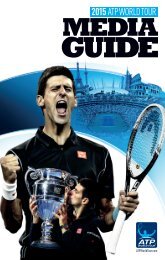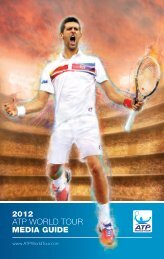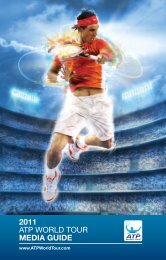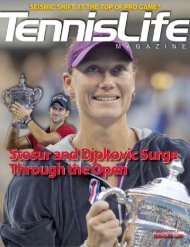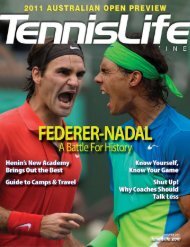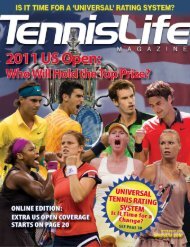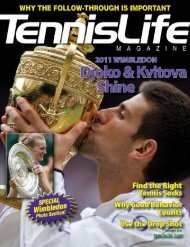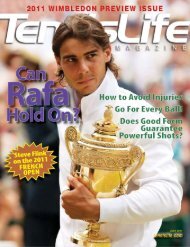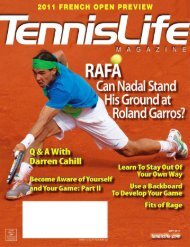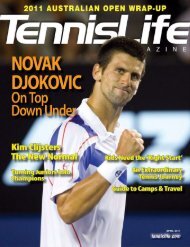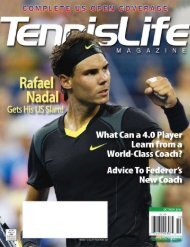A Champion's Mind - Pete Sampras
www.tennismoscow.me Insta:TENNISMOSCOW
www.tennismoscow.me Insta:TENNISMOSCOW
You also want an ePaper? Increase the reach of your titles
YUMPU automatically turns print PDFs into web optimized ePapers that Google loves.
danger of turning tennis into a schoolyard rock fight. In terms of artistry, my final with Goran was a bust—<br />
although I still believe that it was less because of the styles we played than the specific way Goran and I<br />
matched up. Against a lot of my other grass-court opponents, it was a different story.<br />
Here’s another thing to consider: I’m not sure that long points automatically increase interest in the<br />
game—not by a long shot. People have complained for ages about the boredom of watching endless,<br />
sometimes seemingly aimless, rallies on clay. I think the mix of court speeds and styles of play are great<br />
assets to tennis, and one hidden cost of that tradition is that you occasionally get matchups that produce<br />
one-dimensional tennis on a given surface.<br />
Note that nobody complained about the game being too “fast” or “boring” when Andre Agassi was<br />
playing, say, a Pat Rafter. And nobody rhapsodized about the glories of red clay when two grinders were<br />
having five-hour rallying contests. Goran and I were not the ideal matchup at Wimbledon, although we<br />
often played each other. In the wake of our 1994 match, Wimbledon went to softer, slower balls, and they<br />
began to develop a new grass mixture that ultimately slowed down the courts and made grass-court play<br />
more rally-friendly.<br />
The “Wimbledon is boring” theme spun off another story line: “<strong>Sampras</strong> is boring—and a menace to the<br />
game with his domination.” I stood accused of playing brilliant tennis that won minds, but not hearts.<br />
After one of my matches, a tabloid ran the simple headline SAMPRAZZZZZZZZ. . . . I had been raised to<br />
believe that winning matches is what counted, and that you didn’t make a fuss or draw attention to<br />
yourself as you went about that job. Now being good was boring, and a threat to tennis.<br />
It wasn’t easy to read that stuff, and it was the last thing I wanted to talk about in my press conferences.<br />
Whatever I said was bound to come off as defensive, self-justifying, or both. Some people took it upon<br />
themselves to interpret my extraordinary self-control as evidence of a lack of emotion. This struck me as<br />
pretty arrogant. I had emotions, all right, trust me on that; I just knew how to master them, and that was<br />
true on and off the court. That’s no mean feat in a sport known for producing hotheads and emotional<br />
powder kegs.<br />
Players like John McEnroe, Jimmy Connors, and Boris Becker won legions of fans because they so<br />
freely vented their emotions. I understood that they needed to do that to play—or feel like they were<br />
playing—their best tennis. And, of course, it always made good copy, and added an extra layer of interest<br />
to the personalities of those guys. I never begrudged or envied that. But I also felt that the media could<br />
have done more to appreciate that I was the yin to their yang.<br />
In tennis, you always have two opponents out there—the other guy and yourself. You can’t worry too<br />
much about the other guy, other than dealing with the shots he sends your way. The most important guy you<br />
have to beat is yourself—the part of you that’s prone to doubt, fear, hesitation, and the impulse to give up.<br />
If you’re too busy struggling with yourself, like some players, you can hardly be expected to beat your<br />
opponent.<br />
If you want to be great, get your own issues out of the way and play with a clear mind—then it’s just a<br />
constant struggle for mastery of your opponent. The John McEnroes of this world are the exception rather<br />
than the rule. Like most players, I always took emotional outbursts by my opponents as opportunities.<br />
When a guy started losing it out there, I knew I’d gotten to his game or his mind.<br />
I also was less interested in being appreciated or understood than in being a champion, and I didn’t<br />
mind being an exemplary one. I wanted to wring every ounce of potential out of the Gift, and the only way<br />
I could see doing that was through self-control. I also believed that if I just lived up to my potential,<br />
appreciation and even understanding would follow. That was my blueprint for success, and it created a<br />
backlash once it began to pay off. It didn’t help that guys like McEnroe and Jimmy Connors were running<br />
around bemoaning the lack of “personality” in tennis.




